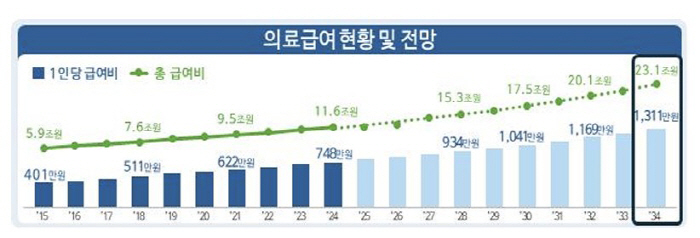Medical benefit recipients' out-of-pocket fixed payment → fixed rate system...30% of outpatient treatment is applied if it exceeds 365 times a year
Apr 25, 2025
In the future, the out-of-pocket system of medical benefit recipients will be changed from 'fixed system' to 'fixed system', and if the number of outpatient treatments exceeds 365 times a year, the out-of-pocket rate of 30% will be applied.
The Ministry of Health and Welfare announced on the 25th that it reported to the Central Medical Benefit Review Committee, a policy deliberation body, how to improve the medical benefit system. The improvement plan embodies the direction of improvement of the medical benefit system announced by the government on July 25 last year and supplements measures to improve access to medical care.
Medical benefits that the state supports medical expenses for the low-income class are an important means of medical security along with health insurance. The medical benefit system guarantees 91.3% of medical expenses (64.9% of health insurance), and has contributed to reducing the burden of medical expenses and improving access to medical care for low-income families. Compared to health insurance subscribers with similar age, income, and health conditions, medical use by medical benefit recipients is 1.4 times more per person and 1.3 times more days of outpatient use. As of last year, the total expenditure of medical benefits was 11.6 trillion won, and it is expected to reach 23 trillion won by 2034.
The government has made improvements to the sustainability of the medical benefit system.
First of all, it is to expand coverage. The support cost, which is the standard for supporting medical benefits, will be lowered from 30% or 15% of the income standard for those obligated to support to 10% to expand the scope of benefits. Support for vulnerable people will be strengthened by adding new patients with severe dementia and schizophrenia to those who are exempted from out-of-pocket expenses. In addition, in order to improve medical services for mental illness, the fee for admission and isolation protection in psychiatric closed wards will be newly established, and the fee standard for outpatient counseling treatment will be eased from twice a week to seven times.
The salary management system will also change. The out-of-pocket system of medical recipients changes from a fixed-rate system to a fixed-rate system. Pay management will be improved from the method of limiting the number of days of medical use per year by adding up the outpatient, hospitalization, and administration periods to managing according to the characteristics of each type. In the case of outpatients, the out-of-pocket expenses, which are currently 1,000 to 2,000 won per case, are reorganized to be proportional to medical use at 4-8% of the medical expenses. The management of excessive medical use will be strengthened by applying a 30% out-of-pocket rate to medical recipients whose outpatient use exceeds 365 times a year. In the case of health insurance subscribers, the out-of-pocket rate has been raised to 90% if the number of outpatient treatments exceeds 365 times a year since July last year.
However, with the introduction of the proportional out-of-pocket expenses, a multi-layered out-of-pocket support system is established to ensure access to essential medical use. The maximum out-of-pocket expenses that recipients of medical benefits spend on one treatment will be set at 20,000 won for outpatient treatment and 5,000 won for pharmacies to ease the burden of high-cost medical treatment and maintain the upper limit of 50,000 won for monthly medical expenses. The cost of maintaining a healthy life will be doubled from 6,000 won to 12,000 won per month to expand out-of-pocket support.
The system improvement plan will be implemented from October after revising laws such as the enforcement ordinance of medical benefits, reorganizing the computer system, and guiding recipients. However, the difference in outpatient burden of 365 times and exemption from the burden of severe dementia and schizophrenia will be implemented in January next year.
The Ministry of Health and Welfare announced on the 25th that it reported to the Central Medical Benefit Review Committee, a policy deliberation body, how to improve the medical benefit system. The improvement plan embodies the direction of improvement of the medical benefit system announced by the government on July 25 last year and supplements measures to improve access to medical care.
|
|
The government has made improvements to the sustainability of the medical benefit system.
First of all, it is to expand coverage. The support cost, which is the standard for supporting medical benefits, will be lowered from 30% or 15% of the income standard for those obligated to support to 10% to expand the scope of benefits. Support for vulnerable people will be strengthened by adding new patients with severe dementia and schizophrenia to those who are exempted from out-of-pocket expenses. In addition, in order to improve medical services for mental illness, the fee for admission and isolation protection in psychiatric closed wards will be newly established, and the fee standard for outpatient counseling treatment will be eased from twice a week to seven times.
The salary management system will also change. The out-of-pocket system of medical recipients changes from a fixed-rate system to a fixed-rate system. Pay management will be improved from the method of limiting the number of days of medical use per year by adding up the outpatient, hospitalization, and administration periods to managing according to the characteristics of each type. In the case of outpatients, the out-of-pocket expenses, which are currently 1,000 to 2,000 won per case, are reorganized to be proportional to medical use at 4-8% of the medical expenses. The management of excessive medical use will be strengthened by applying a 30% out-of-pocket rate to medical recipients whose outpatient use exceeds 365 times a year. In the case of health insurance subscribers, the out-of-pocket rate has been raised to 90% if the number of outpatient treatments exceeds 365 times a year since July last year.
However, with the introduction of the proportional out-of-pocket expenses, a multi-layered out-of-pocket support system is established to ensure access to essential medical use. The maximum out-of-pocket expenses that recipients of medical benefits spend on one treatment will be set at 20,000 won for outpatient treatment and 5,000 won for pharmacies to ease the burden of high-cost medical treatment and maintain the upper limit of 50,000 won for monthly medical expenses. The cost of maintaining a healthy life will be doubled from 6,000 won to 12,000 won per month to expand out-of-pocket support.
The system improvement plan will be implemented from October after revising laws such as the enforcement ordinance of medical benefits, reorganizing the computer system, and guiding recipients. However, the difference in outpatient burden of 365 times and exemption from the burden of severe dementia and schizophrenia will be implemented in January next year.
This article was translated by Naver AI translator.















